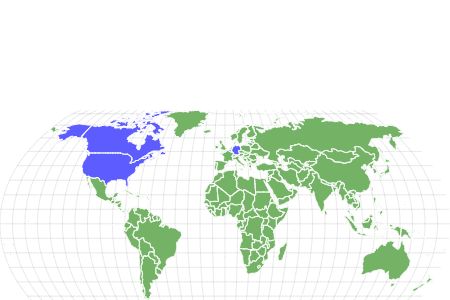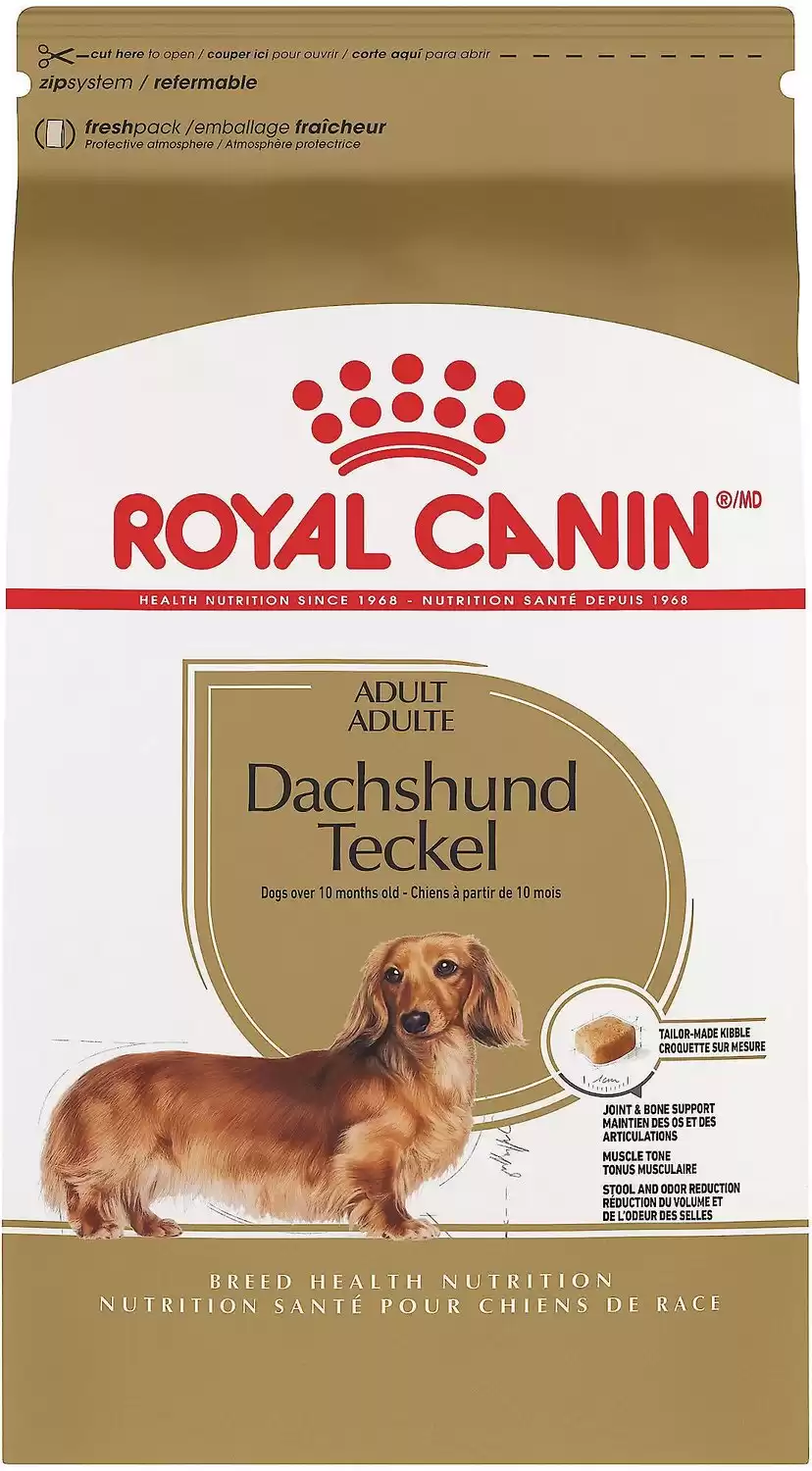Piebald Dachshund
Canis lupus
Hotdogs were originally called "Dachshund sausages" because they resembled the dachshund's wiener-like body!
Advertisement
Piebald Dachshund Scientific Classification
- Kingdom
- Animalia
- Phylum
- Chordata
- Class
- Mammalia
- Order
- Carnivora
- Family
- Canidae
- Genus
- Canis
- Scientific Name
- Canis lupus
Read our Complete Guide to Classification of Animals.
Piebald Dachshund Conservation Status
Piebald Dachshund Facts
- Group Behavior
- Pack
- Fun Fact
- Hotdogs were originally called "Dachshund sausages" because they resembled the dachshund's wiener-like body!
Piebald Dachshund Physical Characteristics
- Color
- Brown
- Fawn
- Red
- Blue
- Black
- White
- Dark Brown
- Black-Brown
- Skin Type
- Hair
- Age of Weaning
- 5-6 weeks
- Aggression
- Medium
Piebald Dachshund as a Pet:
- General Health
- Energy Level
- Shedability
- Trainability
- Intelligence
- Tendency to Chew
- Size
- Family and kid friendliness
- Yappiness / Barking
- High
- Separation Anxiety
- Moderate
- Preferred Temperature
- Average climate
- Exercise Needs
- Moderate
- Friendly With Other Dogs
- Moderate
- Pure bred cost to own
- $400 to $2000
- Dog group
- Hound
- Male weight
- 16-32 lbs
- Female weight
- 16-32 lbs
This post may contain affiliate links to our partners like Chewy, Amazon, and others. Purchasing through these helps us further the A-Z Animals mission to educate about the world's species.
View all of the Piebald Dachshund images!
The dachshund breed is famous for its long, low-slung body, short legs, and alert expression. Its adorable physique combines with a perky, outgoing personality to render it one of the world’s most memorable dog breeds. Piebald dachshunds are similar to regular dachshunds in every way except one: their unusual coloration. A piebald coat is one that contains darker patches and spots layered over a white or cream background. The patches may be black, brown, chocolate, tan, red, blue, wheaten, or fawn. There are smooth, wirehaired, and longhaired dachshunds.
The dachshund originated in Germany in the 15th century as a hunting dog. Its name literally means “badger dog.” The piebald variety is the result of parents who both carry the recessive piebald gene. In keeping with their hunting roots, modern dachshunds are courageous, alert, and athletic. In addition to this, they are extremely loyal to their owners and typically friendly to other humans and dogs.
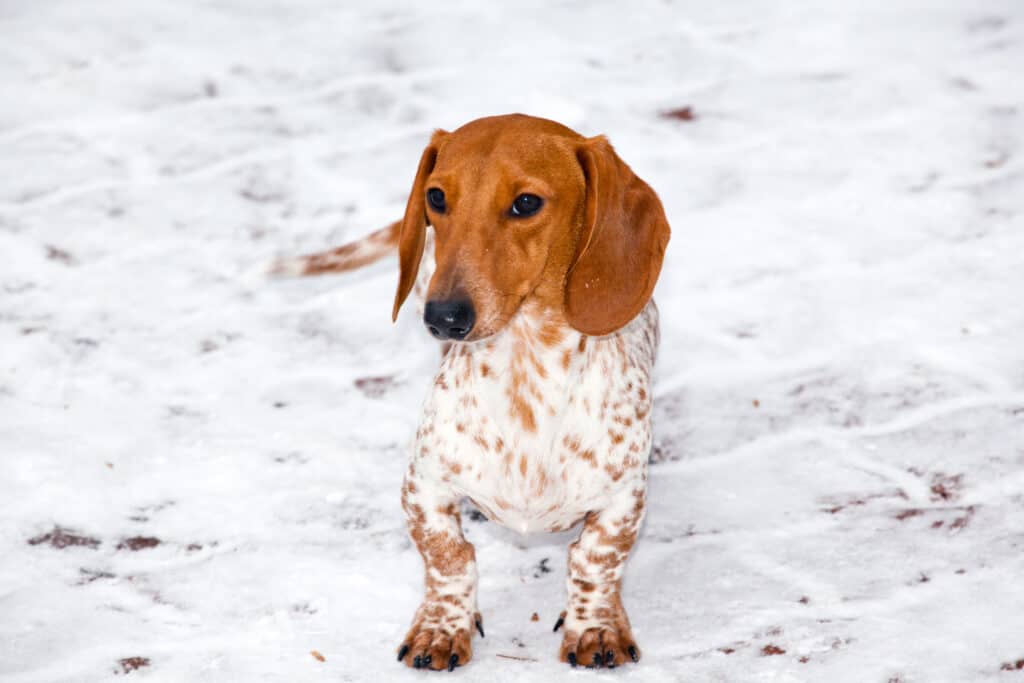
Piebald Dachshunds have darker patches and spots overtop a white or beige background.
©iStock.com/Gorlov
The 40+ Different Types of Piebald Dachshund and Piebald Dachshund Mixes
As piebald dachshunds are a color variant, not a separate breed, this list includes common dachshund mixes.
- Doxle
- Jackshund
- Docker
- Dashalier
- Dachsador
- Schweenie
- Chiweenie
- Shethund
- Pekehund
- Toy Rat Doxie
- Bo Dach
- Doxiepoo
- Border Weenie
- Papshund
- Doxie Cairn
- Doberman Dachshund
- Great Dane Dachshund
- Dameranian
- Dachsweiler
- Boxer Dachshund
- Dachsi Apso
- Doxie Pin
- Mauxie
- Basschshund
- Dusky
- Dalmachshund
- Dach Griffin
- Daug
- Dorkie
- Miniature Schnoxie
- West Highland Doxie
- French Bull Weiner
- Silkshund
- Golden Dox
- Toy Foxie Doxie
- Smooth Foxie Doxie
- Wire Foxie Doxie
- Dorgi
- Crestoxie
- Dachshund Shepherd
- Doxie Chon
- Dox-Bull
- Doxiemo
Owning a Piebald Dachshund: 3 Pros and Cons
| Pros | Cons |
|---|---|
| Playful and affectionate. Piebald dachshunds make playful, loving companions. They fit in well with family life and get along well with children. | Can be barky. Dachshunds are hunters and watchdogs by nature. This can make them barky. Owners may find it difficult to hush a dachshund that perceives itself as guarding its pack or territory. |
| Does well in a small living environment. Though they love walks and playtime, dachshunds are diminutive enough to do well in a small living environment like a condo or an apartment. Just be sure they get enough stimulation so they don’t become bored and destructive. | Can be territorial. Although dachshunds are typically friendly and outgoing dogs, their keen nature renders some individuals aggressive or territorial. Proper training is essential to prevent this from becoming a lifelong issue. |
| Long life expectancy. Like regular dachshunds, piebald dachshunds can expect to live between 12-16 years. This is due to their small size. | Health issues. Piebald dachshunds may have more health concerns than regular dachshunds due to their unusual genes. Congenital deafness is a health issue peculiar to the piebald variation. |
Piebald Dachshund Size
Like regular dachshunds, piebald dachshunds come in two sizes: standard and miniature. Standard male dachshunds stand about 9 inches tall while females reach only 8 inches in height. Both sexes can weigh anywhere between 16 to 32 pounds. Miniature dachshunds, on the other hand, typically weigh 11 pounds or less and stand only five to six inches tall. Standard dachshund puppies weigh about 5 pounds at eight weeks of age; by six months, they should weigh between 22 and 25 pounds.
| Height (Male, standard) | 9 inches tall |
| Height (Female, standard) | 8 inches tall |
| Weight (Male, standard) | 16-32 pounds |
| Weight (Female, standard) | 16-32 pounds |
Piebald Dachshund Health Issues
Piebald dachshunds live as long as 12-16 years, making them one of the longer-lived breeds. However, there are certain health issues associated with their breed and variety. All of the health issues they encounter occur in regular dachshunds except for one: congenital deafness. Piebald dachshunds are particularly susceptible to becoming deaf within their first few weeks of life. This condition causes the nerve endings in the inner ear to atrophy due to the unpigmented skin.
Health issues common to all dachshunds include intervertebral disc disease (IVDD), a condition that affects the spine, causing pain and possible paralysis. Another condition, progressive retinal atrophy (PRA), causes blindness in both eyes over a period of time. Other eye issues include glaucoma and cataracts.
Dachshunds may also develop acanthosis nigricans, “the disturbing black spot,” which is a skin condition resulting from hyperpigmentation. More serious is Lafora disease, a form of progressive myoclonus epilepsy causing seizures. Dachshunds are also prone to obesity, which can cause other health complications.
In summary, the most common health concerns for dachshunds are:
- Congenital deafness
- Intervertebral disc disease
- Progressive retinal atrophy
- Glaucoma
- Cataracts
- Acanthosis nigricans
- Lafora disease
- Obesity
Piebald Dachshund Temperament
In keeping with their hunting background, piebald dachshunds have an abundance of courage and assertiveness. They aren’t afraid to hold their own in contests with bigger dogs and often see themselves as the protectors of their families. They also make keen watchdogs and will readily bark at strangers, both humans and other dogs.
However, despite their sometimes overly bold personalities, dogs of this breed are loving and loyal toward their owners. They love to play and have ample energy for their size. When it comes to obedience, they can be stubborn, so firmness is needed.
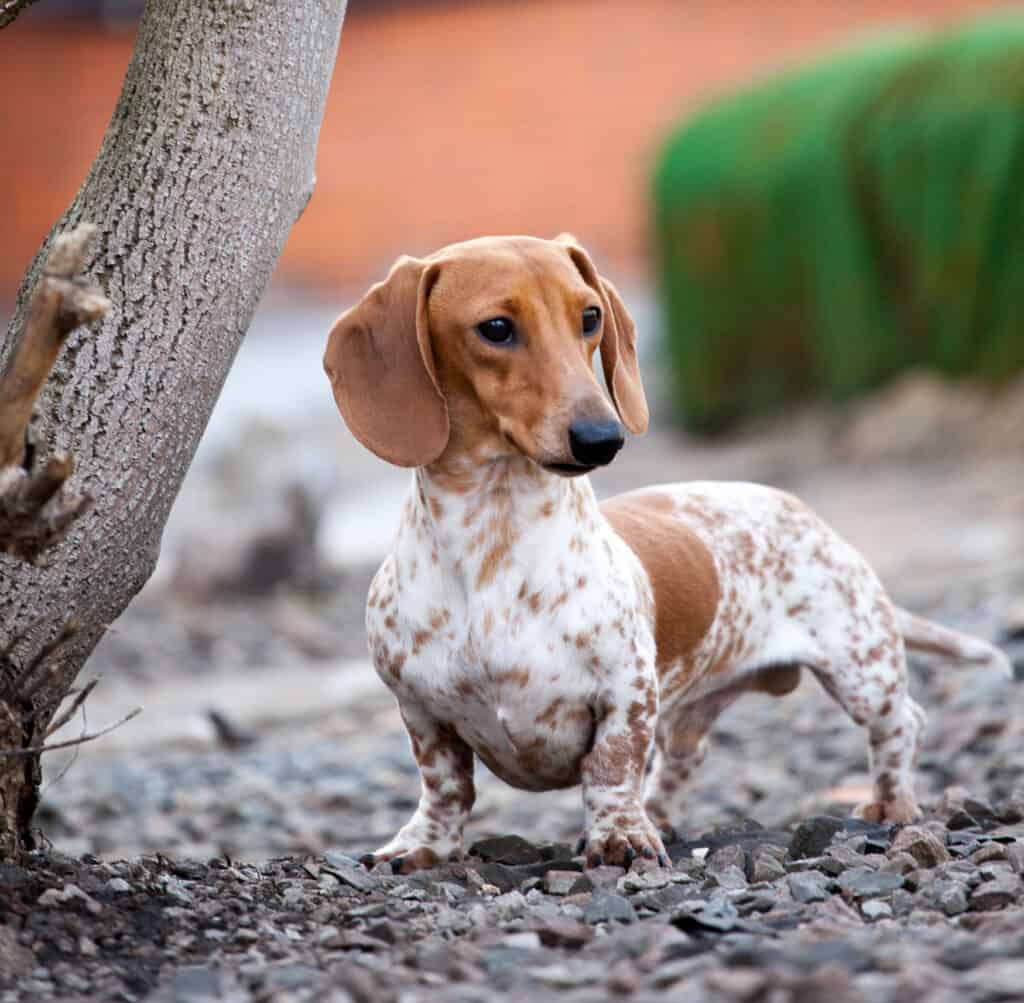
Piebald dachshunds live as long as 12-16 years, making them one of the longer-lived breeds.
©iStock.com/Gorlov
How to Take Care of a Piebald Dachshund
Piebald dachshunds may be adorable to look at, but there are many factors that go into providing for their needs. Owners should take note of the following areas like how to feed, groom, and train their new companion.
The Best Dog Food for Piebald Dachshunds
The nutritional needs of a piebald dachshund are the same as those of the regular variety. Because of their unique bone structure, especially their long backbones, adults need dog food with ample calcium and phosphorus to keep their bones strong.
Given these needs, we at A-Z Animals feel confident recommending Royal Canin Breed Health Nutrition Dachshund Adult Dry Dog Food. Scientists have specially designed this food for dachshunds with appropriately sized pieces and L-carnitine for well-developed muscles. Its high calcium and phosphorus content will keep their small bones strong. A 22-pound adult of this breed should eat 1 ¾ to 2 ¼ cups of food a day. Keep in mind, this food is most appropriate for dogs from 10 months to eight years of age.
In general, puppies require more protein and fat in their diet than do adults due to their ongoing development. Whereas adults should eat twice a day, puppies need three smaller meals to keep them from overindulging and to provide them with sources of energy throughout the day. A daily food allowance of ⅔ to 2 ¼ cups of food split between three meals is wise. The exact amount will vary and change based on your puppy’s age.
- Royal Canin Dachshund Adult Dry Dog Food formulated for purebred Dachshunds 10 months and older
- Unique kibble shape for Dachshunds
- Fortified with Calcium and phosphorus for healthy joints, bones, and long backbone
- Protein content and L-carnitine for muscle support
Maintenance and Grooming
All three types of dachshunds shed moderately, though the double-coated wiry-haired dachshund is the worst. The breed is not hypoallergenic. Weekly brushing is sufficient for short-haired dachshunds. Wirehaired and longhaired dachshunds need more frequent grooming. Brushing them several times a week or even daily will keep their coats from knotting. Hand stripping (removing dead hairs from the coat by hand) should take place twice a year for wirehaired dachshunds. A bath once every six to nine weeks should be sufficient depending on the individual dog.
As with any breed, it is essential to keep dachshunds’ nails trimmed and tidy to avoid injury and pain. Cleaning the ears and teeth on a regular basis will help avoid health issues down the road.
Training
Piebald dachshunds are very intelligent dogs, quick to understand what their owners want. However, their natural independence can lead to stubbornness. Firmness, consistency, and patience are required to successfully train a dachshund. Positive reinforcement is the best way to encourage this breed to comply. If necessary, owners should consider completing a puppy training course with their dachshund to foster obedience and social skills.
Puppies
Piebald dachshund puppies are extremely playful and outgoing. Early training will help curb common behaviors like nipping or barking. Games like fetch that exercise their natural hunting instincts will keep them stimulated and happy. Exposing them to frequent encounters with strangers and other dogs will enable them to learn appropriate ways of interacting nonaggressively.
Puppies of this breed are at risk for congenital deafness due to a lack of pigmentation in their inner ears. Owners should be aware of this risk and closely monitor their puppies for signs of hearing loss throughout the first few weeks of life.
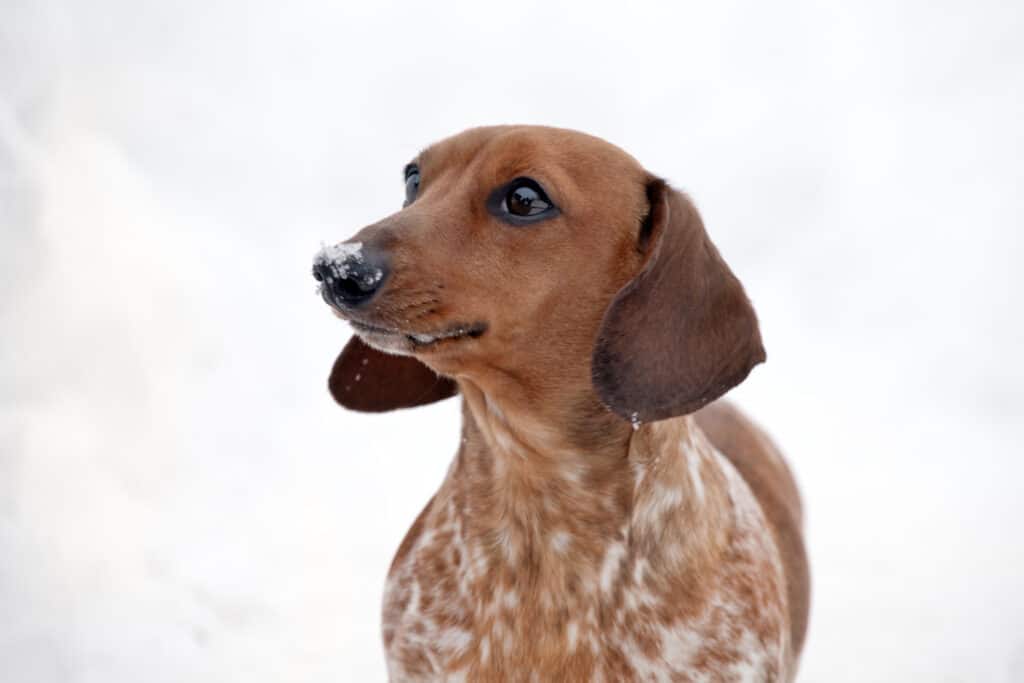
Piebald Dachshunds have bold personalities but are also loving and loyal.
©iStock.com/Gorlov
Piebald Dachshunds and Children
Piebald dachshunds are generally good with children. Their friendly temperaments and playful natures lend themselves well to interactions with kids. Because they are so tiny, they’re also less likely than a big dog to inadvertently harm small children while playing.
On that note, just remember that a dachshund is a small dog and prone to injure itself during rough play. Their long backs are a liability and so teaching children to handle them carefully and hold them properly is key.
Dogs Similar to the Piebald Dachshund
- Dapple Dachshund: This is another color variant of regular dachshunds. The dapple variety has dark coats with lighter markings on top as opposed to piebald dachshunds, which have light coats with dark markings.
- Pembroke Welsh Corgi: With a similarly low-slung body, the corgi appears similar to the dachshund. They both exhibit courage, stubbornness, and affection toward their owners. However, the corgi’s origins are in herding cattle, not hunting. It is also slightly larger.
- Basset Hound: The basset hound’s long, low body may be reminiscent of the dachshund, but it is significantly larger and heavier. Also, the basset hound has less energy.
Popular Names for Piebald Dachshunds
- Bella
- Milo
- Daisy
- Oliver
- Coco
- Ginger
- Pepper
- Millie
Related Animals
View all 192 animals that start with PPiebald Dachshund FAQs (Frequently Asked Questions)
How much does a piebald dachshund cost to own?
Piebald dachshund puppies typically cost between $400 and $2,000. They are usually more expensive than regular dachshunds due to their unusual coloring.
Are piebald dachshunds good with kids?
Well-socialized piebald dachshunds are generally good with children as long as they aren’t manhandled.
Are piebald dachshunds friendly toward other dogs?
Most piebald dachshunds are friendly toward other dogs, though some individuals can be aggressive due to poor socialization. Their hunting background causes some of them to be territorial.
How long do piebald dachshunds live?
Piebald dachshunds live an average of 12-16 years.
Do piebald dachshunds shed?
Piebald dachshunds are moderate shedders.
Are piebald dachshunds hypoallergenic?
No, piebald dachshunds are not hypoallergenic.
What is the difference between a piebald dachshund and a dapple dachshund?
Piebald dachshunds have light coats with dark markings while dapple dachshunds have dark coats with light markings.
What is the difference between a piebald dachshund and a dapple dachshund?
Piebald dachshunds have light coats with dark markings while dapple dachshunds have dark coats with light markings.
Thank you for reading! Have some feedback for us? Contact the AZ Animals editorial team.
Sources
- Sausage Dog World, Available here: https://www.sausagedogworld.com/piebald-dachshund/

